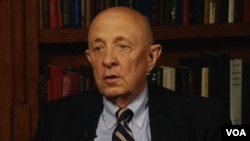With officials from Iran and six world powers reported close to reaching a landmark nuclear deal, speculation is widespread on what the final accord will look like and if it truly will scale back Iran's atomic program.
Iran and the P5 +1 – the five permanent members of the U.N. Security Council plus Germany – are negotiating in Vienna, Austria, trying to compromise on the major sticking points.
Iran insists it will not allow international inspectors access to military sites, to interview scientists or to review documents to verify its compliance with a nuclear deal.
The two sides also have been debating the pace of lifting sanctions that have crippled Iran's economy and Iran's push to have an arms embargo lifted.
'Completely unhelpful'
In an interview with VOA's Persian News Network, former CIA Director James Woolsey said Iran has been "completely unhelpful" on the issues of U.N. inspections and the arms embargo, which was imposed in 2007 under a U.N. resolution to prevent Iran from importing and exporting conventional weapons.
"With respect to the possible military dimensions of Iran's program, that essentially says you can't really negotiate a deal on what they can do and can't do in their efforts to enhance their nuclear capabilities unless you know where they are now," Woolsey said.
"And you can't know where they are now if you're not shown or told. And Iran is prohibiting any cooperation toward that end, so it's sort of a ridiculous position. And so I think the U.S. caving on that issue would be a very bad thing," he added.
'Nuclear Middle East'
Woolsey, who served as CIA director from 1993 to 1995 in the Clinton administration, opposed lifting the arms embargo.
"Why the United States should loosen up on the world's No. 1 terrorist state and make it easier for it to export conventional weapons," he said, "including those that can be used to attack Saudi Arabia, Egypt, Israel, a whole host of places that we do not want the Iranians and the Iranian proxies such as [the Lebanese militant group] Hezbollah to attack ... they have a great many weapons already that they have obtained in one way or another over the years, and they are the major threat as a nation-state to the stability of the Middle East.
"They're also a major reason why we'll have a nuclear Middle East," Woolsey added.
In addition to Hezbollah, Iran is believed to be secretly supplying weapons to other regional players, including the Houthi Shi'ite rebels in Yemen and the Palestinian militant group Hamas.
A senior international policy analyst with the U.S.-based Rand Corporation, Alireza Nader, does not think a final nuclear deal will trigger an arms race in the Middle East.
"If we are talking about nuclear arms, this is unlikely, as the cost of producing or creating a nuclear weapons program is very high in terms of the economic, political and geopolitical costs," Nader said in a separate interview with VOA.
Deterrence
"For example, if ‘country X’ wanted to emulate Iran, then it would be deterred by the costs Iran has borne by sanctions and isolation," he said. "And a lot of the countries in the Middle East are allied with the United States, and essentially they would either have to jeopardize their alliance [by pursuing nuclear weapons] or go ahead and produce nuclear weapons.
"In terms of conventional arms, there is already an arms race in the Middle East, regardless [of Iran]," Nader said.
Nader voiced optimism that a final nuclear deal could be a very solid accord if it is based on the framework agreement reached in April.
"For the first time in 12 years, Iran and the P5+1 will have come to an agreement in terms of what Iran will be able to do regarding its nuclear program," Nader said.
"Potentially, this agreement will prevent Iran from developing nuclear weapons capability but also allow Iran to pursue peaceful nuclear activity. And overall this could be good for global security and regional stability in the Middle East," he said. "It could really release or decrease tensions between the United States and Iran that have built over the last 10 years.”
Israeli attack
In his interview with VOA, Woolsey was asked to comment on Israeli Defense Minister Moshe Ya'alon's criticism of the potential nuclear agreement.
Ya'alon told Israeli defense officials Monday that "even if there are some last-minute improvements, the agreement as we understand it is bad, allowing Iran to legitimately become a nuclear threshold state.
"The bottom line is, a bad deal is coming, and after it, we will have to be prepared to defend ourselves on our own," Ya'alon continued.
"Israel has always had to defend itself," Woolsey said. "It's done so successfully since it was attacked by its neighbors in 1947-48 at its birth.
"I think it's possible that what was implied there was military action to set back or destroy the Iranian nuclear program and perhaps other instruments of state power," he said. "I think that's something that Israel would have to very seriously consider, and they have to consider it even more seriously because we have not been effective in working alongside them to try to constrain Iran's behavior in any way at all.
'Running free'
"Iran is running free in its support of terrorism, and its work on nuclear weapons and nuclear infrastructure," Woolsey added. "That is an existential threat to Israel."
Iran does not recognize the Jewish state's right to exist, and Israel has often threatened to attack Iranian nuclear installations.
The current negotiations have run more than two weeks and missed four deadlines.
Because the talks have been extended, the U.S. Congress will have 60 days to assess the final deal.
Congressional leaders are predicting that U.S. President Barack Obama could face hurdles in Congress if negotiators reach a final agreement.
